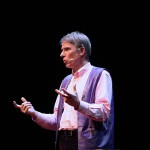Love is not a sentiment which can be easily indulged in by anyone, regardless of the level of maturity reached by him. All his attempts for love are bound to fail, unless he trys most actively to develope his total personality, so as to achieve a productive orientation; that satisfaction in individual love cannot be attained without the capacity to love one’s neighbour, without true humility, courage, faith and discipline. In a culture in which these qualities are rare, the attainment of the capacity to love must remain a rare achievement. Or – anyone can ask himself how many TRULY loving persons he he known.
If two people who have been strangers, as all of us are, suddenly let the wall between them break down, and feel close, feel one, this moment of oneness is one of the most exhilarating, most exciting experiences in life.
It is all the more wonderful and miraculous for persons who have been shut off, isolated, without love. This miracle of sudden intimacy
is often facilitated if it is combined with, or initiated by, sexual attraction and consummation. However, this type of love is by its very nature not lasting.
The two persons become well aquainted, their intimacy loses more and more of its miraculous character, until their antagonism, their disappointments, their mutual boredom kill whatever is left of the initial excitement. Yet, in the beginning they do not know all this: in fact, they take the intensity of the infatuation, this being “crazy” about each other, for proof of the intensity of their love, while it may only prove the degree of their preceding loniness. There is hardly any activity, any enterprise, which is started with such tremendous hopes and expectations, and yet, which fails so regularly, as love. If this were the case with any other activity, people would be eager to know the reasons for the failure, and to learn how one could do better – or they would give up the activity.
The first thing we have to learn is that love is an art, just as living is an art; if we want to learn how to love we must proceed in the same way we have to proceed if we want to learn any other art. Maybe here lies the answer to the question of why people in our culture try so rarely to learn this art, in spite of their obvious failures: in spite of the deep-seated craving for love, almost everything else is considered to be more important than love: success, prestige, money, power – almost all our energy is used for learning of how to achieve these aims, and almost none to learn the art of loving.
Could it be that only these things are considered worthy of being learned with which one can earn money or prestige, and that love, which ONLY profits the soul, but is profitless in the modern sense, is a luxury we have no right to spend much energy on?
Man can only go forward by developing his reason, by finding a new harmony, a human one, instead of the prehuman harmony which is irretrievably lost.
Man is gifted with reason; he is life being aware of itself. This awareness of himself as a separate entity, the awareness of his own short life span, of the fact that he will die before those whom he loves, or they before him, the awareness of his aloneness and separateness, of his helplessness before the forces of nature and of society, all this makes his separate, disunited existence an unbearable prison. He would become insane could he not liberate himself from the prison and reach out, unite himself in some form or other with others, with the world outside.
The experience of separateness arouses anxiety; it is, indeed, the source of all anxiety. Being separate means being cut off, without any capacity to use my human powers. Beyond that, it arouses shame and the feeling of guilt. This experience of guilt and shame in separateness is expressed in the Biblical story of Adam and Eve… who, by recognising their separateness they remain strangers, because they have not yet learned to love each other; Adam defends himself by blaming Eve rather than trying to defend her.
The deepest need of man, then, is the need to overcome his separateness, to leave the prison of his aloneness. The absolute failure to achieve this aim means insanity, because the panic of complete isolation can be overcome only by such a radical withdrawal from the world outside that the feeling of separation disappears – because the world outside, from which one is separated, has disappeared.
In society the union with the group is the prevalent way of overcoming separateness. It is a union in which the individual self
disappears to a large extent, and where the aim is to belong to the herd. If I am like everybody else, if I have no feelings or thoughts which make me different, if I conform in custom, dress, ideas, to the pattern of the group, I am saved; saved from the frightening experience of aloneness.
The dictatorial systems use threats and terror to induce this conformity; the democratic countries, suggestion and propaganda. But in spite of this difference the democratic societies show an overwhelming degree of conformity.The reason lies in the fact that there has to be an answer to the quest for union, and if there is no other or better way, then the union of herd conformity becomes the predominant one. One can only understand the fear to be different, the fear to be only a few steps away from the herd, if one understands the depths of the need not to be separated.
Most people are not even aware of their need to conform. They live under the illusion that they follow their own ideas and inclinations, that they are individualists, that they have arrived at their opinions as the result of their own thinking – and that it just happens that their ideas are are the same as the majority. The consensus of all serves as a proof for the correctness of “their” ideas. Since there is still a need to feel some individuality, such a need is satisfied with regard to minor differences; the initials on the handbag or sweater, the belonging to the Democrate rather than the Republican party, to the Elks instead of the Shriners become the expression of individual differences. The advertising slogan of “it is different” shows up this pathetic need for difference, when in reality there is hardy any left.
Union by conformity is not intense and violent; it is calm, dictated by routine, and for this very reason often is insufficient to pacify the anxiety of separateness. The incidence of alcoholism, drug addiction, compulsive sexualism, and suicide in contemporary society are symptoms of this relative failure of herd conformity.
This desire for interpersonal fusion is the most powerful striving in man. It is the most fundamental passion, it is the force which keeps the human race together. The failure to achieve it means insanity or destrution – self destruction or the destrution of others. Without love humanity could not exist.
Mature love is union under the condition of preserving one’s integrity, one’s individuality. Love is an active power in man, a power which breaks through the walls which separate man from his fellow men, which unites him with others; love makes him overcome the sense of isolation and sepateness, yet permits him to be himself, to retain his integrity. In love the paradox occurs that two beings become one and yet remain two.
Spinoza arrives at the conclusion that virtue and power are one and the same. Envy, jealousy, ambition towards any kind of greed are passions; love is an action, the practice of human power, which can be practised only in freedom and never as a result of a compulsion.
Love is primarily giving, not receiving. Giving is the highest expression of potency. Giving is more joyous than receiving, not because it is deprivation, but because in the act of giving lies the
expression of my aliveness.
Whoever is capable of giving himself is rich. He experiences himself as one who can confer of himself to others. He gives of himself, of the most precious thing he has, he gives of his life. He gives what is live in him; he gives his joy, his intrest, his understanding, his knowledge, his humour, his sadness, he gives of all the expressions and manifestations of that which is alive in him.
In thus giving of his life, he enriches the other person, he enchances the others sense of aliveness by enchancing his own sense of aliveness. In giving he cannot help bringing something to life in the other person, and this which is brought to life reflects back to him and they both share in the joy of what they have brought to life.
Love is a power which produces love. You can exchange love only for love, confidence for confidence, etc. If you wish to enjoy an art, you must be an artistically trained person; if you wish to have an influence on other people you must be a person who has a really stimulating and furthering influence on other people.
In the Book of Jonah, God explains to Jonah that the essence of love is to labour for something and to make something grow, that love and labour are inseparable. One loves that for which one labours, and one labours for that which one loves.
Care and concern imply another aspect of love. Today responsibilty is often meant to denote duty, something imposed on one from the outside. But responsibility, in its TRUE sense, is an entirely voluntary act; it is my response to the needs of others. The loving person respondes.
Responsibility could easily deteriorate into domination and possessiveness, were it not for a third component of love, respect. Respect is not fear or awe; it denotes the ability to see a person as he/she is, to be aware of the unique individuality. Respect means the concern that the other person should grow and unfold as they are. Respect, thus, implies the absense of exploitation. I want the loved person to grow and unfold for their own sake, and not for the purpose of serving me. If I love the other person, I feel one with him or her, but with them as they are, not as I need them to be as an object for my use. It is clear that respect is only possible if I have achieved independence, without having to exploit anyone else. Respect exists only on the basis of freedom, for love is the child of freedom, never that of domination.
To respect a person is not possible without knowing him; care and responsibility would be blind if they were not guided by knowledge.
Knowledge would be empty if it were not motivated by concern. There are many layers of knowledge; the knowledge which is an aspect of love is one which does not stay at the periphery, but penetrates to the core. It is possible only when I can transend the concern for myself and see the other person in his own terms.
Care, responsibility, respect and knowledge are mutually interdependent. They are a syndrome of attitudes which are to be found in the mature person; that is the person who developes his own powers productively, who wants only to have that which he has worked for, who has given up narcissistic dreams of ominiscience and omnipotence, who has aquired humility based on inner strength which only genuine productive activity can give.
If a person loves only one other person and is indifferent to the rest of his fellow men, his love is not love but a symbiotic attachment, or an
enlarged egotism. Yet most people believe that love is constituted by the object, not by the faculty. In fact, they even believe that it is proof of the intensity of their love when they do not love anybody except the “loved” person. This is the same fallacy which I have already mentioned above. Because one does not see that love is an activity, a power of the soul, one believes that all that is necessary to find is the right object – and that everything goes by itself afterward. This attitude can be compared to that of the man who wants to paint but who, instead of learning the art, claims that he just has to wait for the right object – and that he will paint beautifully when he finds it. If I truly love one person I love all persons, I love the world, I love life. If I can say to somebody else, “I love you,” I must be able to say, “I love in you everybody, I love through you the world, I love in you also myself.”
The most fundamental kind of love, which underlies all types of love, is brotherly love. By this I mean the sense of responsibility, care, respect, knowledge of any other human being, the wish to further his life. This is the kind of love the Bible speaks about when it says: Love your neighbour as yourself. Brotherly love is love for all human beings; it is characterized by its very lack of exlusiveness. If I have developed the capacity for love, then I cannot help loving my brothers. In brotherly love there is the experience of union with the whole of mankind, of human solidarity. Brotherly love is based on the experience that we’re all one.
The differences in talents, intelligence, knowledge are negligible in comparison with the identity of the human core common to all men. In order to experience this identity it is necessary to penetrate from the periphery to the core. If I perceive in another person mainly the surface, I perceive mainly differences, that which separates us. If I penetrate to the core, I perceive our identity, the fact of out brotherhood.
Love of the helpless, the poor and the stranger, are the beginning of brotherly love. To love ones flesh and blood is no achievement. The animal loves its young and cares for them. Only in the love of those who do not serve a purpose, does love begin to unfold. Compassion implies the element of knowledge and identification. “You know the heart of the stranger,” says the Bible, “for you were strangers in the land of Egypt;… therefore love the stranger!”
The greatest impediment of mankind is not desease.. it is dispair.
Extracts from – The Art of Loving – By Erich Fromm









